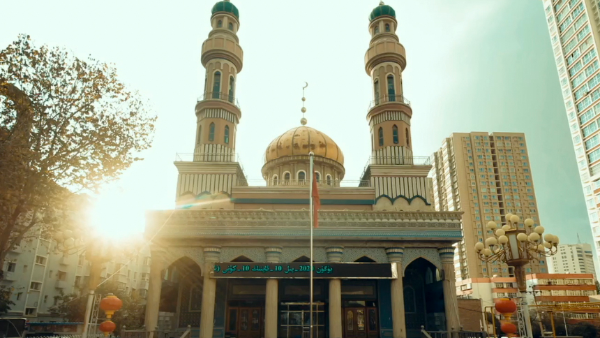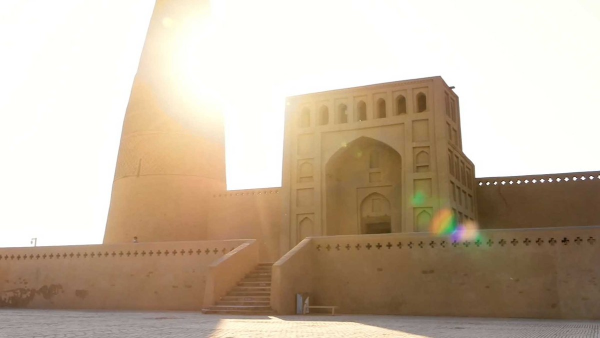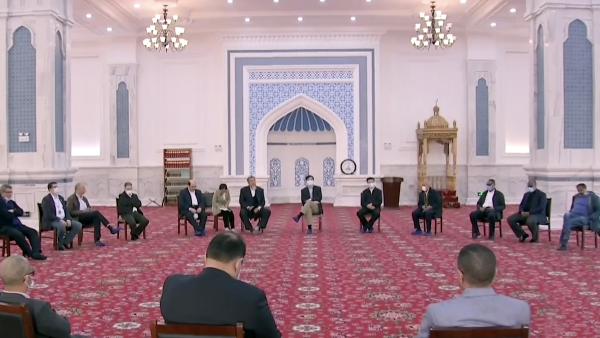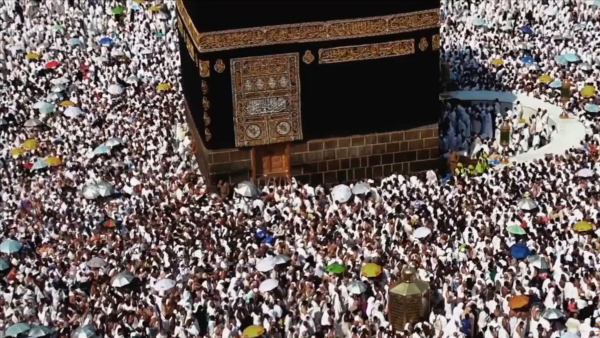
Exploration and Inquiry: A Documentary on Freedom of Religious Belief in Xinjiang, streamed on several foreign language versions of the China Global Television Network, on May 17 and 25, takes the audience on a tour of some of the most renowned and historical religious sites in the Xinjiang Uygur autonomous region, including the 124-year-old Yanghang Mosque and worshippers in the region. [Photo provided to China Daily]
Covering a vast area of more than 1.66 million square kilometers, the Xinjiang Uygur autonomous region is home to many ethnic groups, harmoniously coexisting and following different religions over generations.
However, some hostile voices in the West have distorted the truth, defaming the Chinese government by suggesting that it is using the "demolition of mosques" and "persecution of religious figures" to "restrict religious freedom" or even "eradicate Islam".
Exploration and Inquiry: A Documentary on Freedom of Religious Belief in Xinjiang, a 48-minute feature streamed on the Arabic and English versions of the China Global Television Network, respectively on May 17 and 25, travels to some of the most renowned and historical religious sites in the region, rebutting the rumors with facts.
According to the producers, the documentary is also translated into French, Spanish and Russian, which has also been broadcast on the CGTN's respective language channels to reach a global viewership.
Consisting of four parts, with themes ranging from protection to exchange and communication, the documentary visits a string of cities and counties, including the region's capital Urumqi and 2,000-year-old Kashgar in southern Xinjiang, interviewing local religious leaders, worshippers and experts to explore the truth.
As the largest and most prosperous city in Xinjiang, Urumqi has a well-preserved diversity of religions, with the local landmark religious sites for Islam, Buddhism and Taoism all being featured in the documentary.

"Traveling" with the documentary, viewers get a glimpse of the architectural beauty of Yanghang Mosque, a 124-year-old venue known for its distinctive green-topped minarets and its exquisitely carved pillars.
Now, the mosque, named after the Yanghang Zone where many foreign merchants lived more than one century ago, is taken by many local and international Muslims as a regular venue for praying and worship.
Dating back to the Emperor Taizong's reign during the Tang Dynasty (618-907), Qingquan Temple-also located in Urumqi-is the largest Buddhist temple in Xinjiang, drawing many people to burn incense and worship Buddha.
Then there is Laohongmiao Taoist Temple, perched on the peak of Pingding Mount in Urumqi, that exemplifies Taoism-which originated from China's native culture and has been a part of Xinjiang's social fabric since it was introduced to the region during Southern and Northern Dynasties (420-581).
As one of many historical religious venues that are still being used today, Id Kah Mosque-which was built in 1468 in Kashgar-has been repaired and maintained many times, as well as the construction of supporting infrastructure in the 1980s.
Religious education, research and international exchanges are also seeing a remarkable development in Xinjiang. Over recent years, religious delegations from Xinjiang have paid many visits to many foreign countries, including Egypt, Saudi Arabia and Turkey, as well as attending Islamic cultural exhibitions and performances held in countries, such as Indonesia and Turkey.
Additionally, statistics show that Xinjiang has published and distributed over 1.7 million book pertaining to Islamic classic and missionary literature, signaling that local Muslims have got more diverse access to religious knowledge.

Saeed Jawad, chief of Indian Embassy News and TV Network, says in the documentary: "What I found special in Xinjiang was that you will find so many cultures and so many different ethnic minority groups in one place.
"I feel very good when I see that the ethnic minority groups are living very comfortably and their religious rights are protected."
Palestinian Ambassador to China Fariz Mehdawi praises the Chinese government for attaching high importance to caring about the Uygur people and local Muslims.
"Muslims in Xinjiang enjoy the freedom of religious beliefs just as that of the Muslims in other countries and regions," he says in the documentary.



Exploration and Inquiry: A Documentary on Freedom of Religious Belief in Xinjiang, streamed on several foreign language versions of the China Global Television Network, on May 17 and 25, takes the audience on a tour of some of the most renowned and historical religious sites in the Xinjiang Uygur autonomous region, including the 124-year-old Yanghang Mosque and worshippers in the region. [Photo provided to China Daily]

